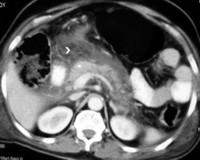Pancreatic Encephalopathy: An Unusual Cause of Asterixis
DOI:
https://doi.org/10.6092/1590-8577/2291Keywords:
Brain Diseases, Metabolic, Dyskinesias, PancreatitisAbstract
Context Pancreatic encephalopathy is the occurrence of neuropsychiatric abnormalities in setting of acute pancreatitis which is not otherwise explained by presence of electrolyte abnormities, or organic lesions. The pathogenesis of pancreatic encephalopathy is incompletely understood. The clinical presentation is variable. Case report A 60 year old male, a diabetic for 5 years, was admitted with three days of abdominal pain associated with vomiting and complicated by altered sensorium for one day. He developed asterixis during the course of his hospital stay. Other workup was non-contributory and patient improved with supportive management. Conclusion Asterixis has not hitherto been reported in pancreatic encephalopathy.
Image: Abdominal CT showing an enhancing pancreas with peripancreatic necrosis.
Downloads
References
Gokula RM, Khasnis A. Asterixis. J Postgrad Med. 2003; 49: 272-275.
Bartha P, Shifrin E, Levy Y. Pancreatic encephalopathy- a rare complication of a common disease. Eur J Intern Med. 2006; 17: 382. [PMID:16864023]
Lu XS, Qiu F, Li YX, Li JQ, Fan QQ, Zhou RG. Effect of lower-molecular weight heparin in the prevention of pancreatic encephalopathy in the patient with severe acute pancreatitis. Pancreas. 2010; 39: 516-519. [PMID:20104197]
Sharf B, Bental E. Pancreatic encephalopathy. J Neurol Neurosurg Psychiatry. 1971; 34: 357-361. [PMID:5315218]
Zhang XP, Tian H. Pathogenesis of pancreatic encephalopathy in severe acute pancreatitis. Hepatobiliary Pancreat Dis Int. 2007; 6: 134-140. [PMID:17374570]


